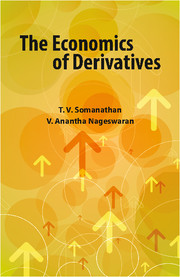Book contents
- Frontmatter
- Dedication
- Contents
- List of Tables, Figures and Boxes
- Foreword
- Preface
- Acknowledgements
- 1 Introduction
- 2 Definition and Typology
- 3 The Economic Functions of Derivatives Markets
- 4 Market Completion
- 5 Derivatives and Price Stabilization
- 6 Derivatives and Price Destabilization
- 7 The Effects of Derivatives on Prices of the Underlying: A Synthesis
- 8 Causes of the Rapid Growth in Derivatives Trading: A Historical Perspective
- 9 The Role of Derivatives in the Global Financial Crisis of 2008
- 10 Models and their Effects on Markets
- 11 Derivatives and Emerging Markets – Part I
- 12 Derivatives and Emerging Markets – Part II
- 13 Regulation of Derivatives
- 14 Derivatives and Development: A Critique
- 15 Regulatory Policy for Derivatives: A Pragmatic Approach
- Index
- About the Authors
Preface
Published online by Cambridge University Press: 05 May 2015
- Frontmatter
- Dedication
- Contents
- List of Tables, Figures and Boxes
- Foreword
- Preface
- Acknowledgements
- 1 Introduction
- 2 Definition and Typology
- 3 The Economic Functions of Derivatives Markets
- 4 Market Completion
- 5 Derivatives and Price Stabilization
- 6 Derivatives and Price Destabilization
- 7 The Effects of Derivatives on Prices of the Underlying: A Synthesis
- 8 Causes of the Rapid Growth in Derivatives Trading: A Historical Perspective
- 9 The Role of Derivatives in the Global Financial Crisis of 2008
- 10 Models and their Effects on Markets
- 11 Derivatives and Emerging Markets – Part I
- 12 Derivatives and Emerging Markets – Part II
- 13 Regulation of Derivatives
- 14 Derivatives and Development: A Critique
- 15 Regulatory Policy for Derivatives: A Pragmatic Approach
- Index
- About the Authors
Summary
Are derivatives markets beneficial to the economy? If so, how and in what circumstances? Can they be harmful to the economy? If so, how and in what circumstances? These are questions that interested us when we (separately and unbeknownst to each other) were doing our doctoral research in the late eighties and early nineties. In the years since then, these questions have become more important because derivatives trading – relatively small when we were students – has grown enormously in size, widened greatly in scope and expanded vastly in geographical spread. In recent years, derivatives have alternately been lauded for boosting prosperity and condemned for causing crises.
As economists who have done research on the subject and (at one time or other) traded derivatives, we have felt the absence of a balanced, concise and comprehensible examination of the economic effects of derivatives markets and their implications for public policy and regulation. This book is a contribution to filling that gap.
Writing this book has broadened and deepened our knowledge, but also made us even more aware of the gaps that remain in the economics of derivatives. Increased volumes of research have not necessarily narrowed these gaps. The field of derivatives has sometimes suffered from spurious precision and doctrinaire overconfidence. While this book will hopefully add to the reader's understanding of the subject, it is important to understand that that understanding will remain incomplete.
- Type
- Chapter
- Information
- The Economics of Derivatives , pp. xvii - xviiiPublisher: Cambridge University PressPrint publication year: 2015
- 2
- Cited by



